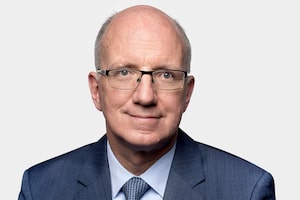Twig Fertility co-founders Dr. Rhonda Zwingerman and Tanner Kohara in their Toronto office on March 28.Jennifer Roberts/The Globe and Mail
Twig Fertility and its venture-capital backer are on a mission to close what they call Canada’s baby gap.
Two years after opening their first clinic in midtown Toronto and a year after venture-capital fund Rhino Ventures invested $8-million to back a national expansion, Twig is set to open a clinic in downtown Toronto in coming weeks and launch a Vancouver clinic early next year.
Twig and other private capital-backed chains, such as The Fertility Partners, are out to provide business solutions to the most personal of challenges – starting a family.
The market for their services is enormous. Approximately one in six couples face issues in conceiving, part of the reason the country’s birth rate hit a record low of 1.33 children per woman in 2022, according to the most recent data from Statistics Canada.
In Canada and the U.S., just 2.5 per cent of couples are able to tap some form of reproductive assistance to have children, according to Jay Rhind, a partner in Vancouver-based Rhino. In Nordic countries and Israel, jurisdictions with robust clinic networks and more generous employer and government funding for programs such as in vitro fertilization (IVF), 10 per cent of babies are born with help from fertility treatments.
Twig is focused on filling the gap between Canada and countries with similar social and economic systems. “Twig’s approach is focused on improving the patient’s experience while driving superior outcomes,” Mr. Rhind said. “The ultimate goal is to ensure it takes less time to have a baby, and it costs less to build your family.”
Long waits for appointments and low patient satisfaction are common at domestic fertility clinics. Twig was born out of the “four years of futility” co-founder Tanner Kohara and his wife Erin went through at numerous clinics before finally having a second child. “The medicine was there,” Mr. Kohara said. “The guidance, the service, the support were not.”
In the spring of 2020, Mr. Kohara, then an investment banker at Eight Capital in Toronto, and colleague Zach Shapiro “sat down and figured out how we could create a better patient experience.” Mr. Shapiro is now Twig’s chief executive officer.
Together with a third co-founder – Twig medical director Rhonda Zwingerman – they drew up a business plan based on a patient-centric approach to building a family. Dr. Zwingerman, formerly an infertility specialist at Toronto’s Mount Sinai Hospital, brought insight gleaned from going through IVF herself.
Twig’s approach includes using technology, as well as staff recruited from complementary industries, such as the hospitality sector, to minimize wait times for patients, while allowing doctors to focus on procedures rather than paperwork. The company is using AI technology, including software designed by an Israeli company, to support decision-making and operational efficiency.
Twig takes a luxury hotel-style approach to treatment, with soft touches such as robes and slippers to slip into when a patient arrives at the clinic. “We try to be thoughtful in our approach, starting with the concept that a fertility patient isn’t sick,” said Emma Mills-George, Twig’s head of strategy and growth.
Since opening in February, 2022, Twig has treated several thousand patients. “Our goal from the start was to create a service and a culture that would work in cities across Canada,” Mr. Kohara said.
The concept of a nationally branded fertility company differentiates Twig from its major competitor, The Fertility Partners (TFP).
Toronto-based TFP is the country’s largest chain, with 36 clinics and 190 doctors in six provinces and two U.S. states. The company typically acquires businesses owned by doctors and continues to operate them under their brand names, while supplying back office support. In private-equity circles, this is known as a roll-up growth strategy.
Former dentist Andrew Miekle founded TFP in 2019. The following year, private-equity fund Peleton Capital invested in the company. In a press release, Peleton managing partner Mike Murray said: “Fertility services is a very dynamic and rapidly growing health care sector.”
Prior to getting into the baby business, Dr. Miekle co-founded the country’s largest chain of dental clinics, Dentalcorp Holdings Ltd. DNTL-T, in 2011. He subsequently sold a stake in the chain to private-equity funds, which took it public in 2021. Dentalcorp is now a $1.2-billion, Toronto Stock Exchange-listed company.
Peleton also backs one of the country’s fastest-growing chains of dental clinics, Vancouver-based 123Dentist.
Twig is focused on building its client base by reaching out to both prospective parents and the companies that employ them. Mr. Kohara said Twig is in talks with a number of large companies to help educate and provide access to services, including IVF and egg freezing, to their employees. In the war for top talent, tech companies such as Apple Inc. AAPL-Q and Google parent Alphabet Inc. GOOGL-Q offer family building and fertility services as part of an employee-retention strategy.
Canadians spent approximately $1.5-billion on fertility services in 2022, according to a study by market research firm Insights10, with the market projected to be $2.7-billion by 2030.
Some of Twig’s introductory services, such as consultations on fertility issues, are covered by provincial health care plans. The bulk of fertility treatments are out-of-pocket expenses for patients. At Twig, the base price on procedures to harvest and freeze eggs is approximately $8,000, while the price tag on IVF starts at $13,000.
Twig also offers services including fertility treatments, egg, sperm and embryo freezing, LGBT2SQ+ family building, genetic testing and counselling, as well as mental health and emotional support.
“Our goal is to make fertility services as efficient and affordable as possible, while ensuring a great patient experience,” Mr. Kohara said.
 Andrew Willis
Andrew Willis